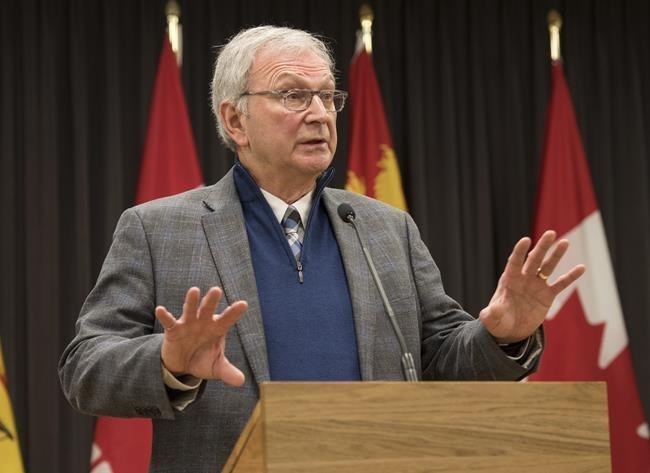FREDERICTON — New Brunswick is allowing more businesses and services to reopen as it launches the next phase of the province's COVID-19 recovery plan.
Stores, offices, restaurants, libraries, museums and campgrounds can open as long as they have a plan that explains how they are meeting public health guidelines, including physical distancing, hand hygiene and allowing staff to remain home when ill.
"Businesses can open effective immediately, but each of them must decide when they are ready to open," Premier Blaine Higgs said Friday. "Some have been preparing for this moment and will be able to open right away. Others will need more time."
Masks will be required anywhere physical distancing of two metres can't be maintained.
"Bubbles" allowing two families to get together remain in place, but Dr. Jennifer Russell, chief medical officer of health, said now outdoor gatherings of up to 10 people are allowed if physical distancing is respected. Up to 10 people are allowed for indoor religious events such as weddings and funerals.
Elective surgeries can be conducted, and regulated professionals such as physiotherapists and dentists can now provide non-emergency services. Universities and colleges can now hold classes in person, but virtual education is preferred.
Daycares can open May 19, while day camps and other child care providers can open once they have all precautions in place. The province has earlier said schools will remain closed until September.
The easing of restrictions comes as Statistics Canada released figures showing New Brunswick's unemployment rate jumped to 13.2 per cent in April from 8.8 per cent in March.
"I've seen the labour force statistics for April that shows nearly 50,000 New Brunswickers are out of work over the last two months due to COVID-19," Higgs said. "Certainly reopening businesses will help reduce that number."
Krista Ross, CEO of the Fredericton Chamber of Commerce, welcomed the reopening and encouraged people to support local businesses. "It's not going to be as simple as turning on the light switch and saying we're open for business," she added. "Businesses are going to have to have some preparations in place."
Russell said the changes are the result of New Brunswickers following public health guidelines, and if current trends continue, more restrictions will be lifted in a few weeks.
Nothing is changing at the provincial borders, and non-essential travel to New Brunswick is still prohibited.
The Prince Edward Island government announced Friday it has no active cases of COVID-19 and members of a household can now gather indoors with up to five other people. Members of the same household can gather outdoors with up to 10 other individuals from different households.
In Nova Scotia, Premier Stephen McNeil announced there will be no return to school this year for the province's students. McNeil said home learning will continue until June 5, and teachers will work to complete assessments and report cards by the end of June.
"That means your kitchen is a classroom for a little bit longer," he said.
He said a decision on whether daycares will reopen would be made by June 8.
Meanwhile, chief medical officer of Health Dr. Robert Strang, gave a rough outline of the plan that would be used to lift COVID-19 restrictions, based on national public health guidelines released this week.
He said the initial phase, for which a date has not yet been set, would see the reopening of non-essential businesses and daycares and a resumption of non-urgent health-care services, such as day surgeries and doctor visits.
Additional outdoor activities would also be allowed, along with essential gatherings such as funerals, and the number of people allowed at gatherings would be increased from five to 10 people.
Strang said the first phase and all subsequent phases would be followed by a 28-day trial period to ensure the measures had not aggravated the spread of the virus.
"Our objective is to move carefully and reopen things as much as possible, but doing things in a safe manner," Strang said. "There are no firm dates on this."
Strang said New Brunswick was able to move to the second phase of its plan on Friday because it was fortunate to have fewer cases of the virus.
"I'm anxious to see what the impact in New Brunswick is on them opening up," he said. "That will give us information . . . to inform some of the steps when we are ready to take them."
This report by The Canadian Press was first published May 8, 2020.
Kevin Bissett and Keith Doucette, The Canadian Press




